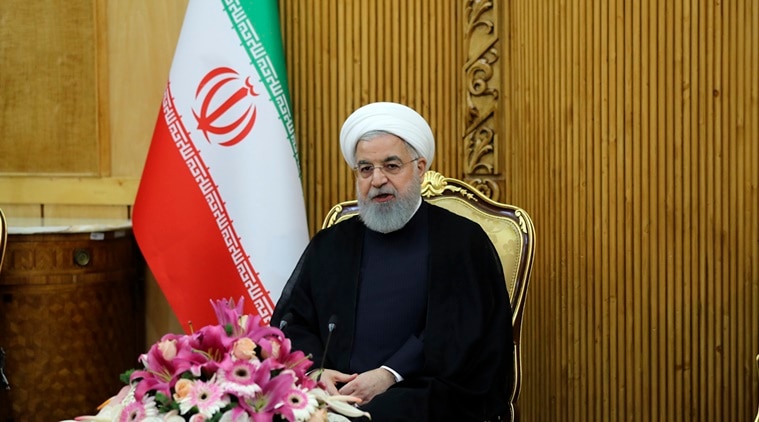
Iranian President Hassan Rouhani said on Tuesday that Iran would not wage war against any nation.
The statement came after Pentagon announced that the US was sending about 1,000 troops to Middle East to strengthen security in the region in face of what they called was a growing threat from Iran. Iranian officials had earlier said that Iran will surpass the uranium-stockpile limit set by the 2015 nuclear deal in ten days, which had sought to limit its nuclear capabilities.
Tensions have escalated between the US and Iran ever since last Thursday when two oil tankers were hit in attacks in the strategic Strait of Hormuz shipping lane in the Gulf of Oman, a month after similar attacks hit four such tankers in the same region. Washington has blamed Tehran for the attacks and released video and photographs in support of its accusations. Iran has repeatedly denied involvement and called the accusations “baseless” and “alarming”.
Heightening tensions and stoking fears of a confrontation between the two countries have invited worries from all over the world as any duel would mean a hard-hitting impact on all stakeholders.
China, Russia and Europe
Breaching the Uranium limit, which was set by the landmark 2015 nuclear deal, would prompt a diplomatic crisis which will force the other signatories like China, Russia and other European powers to confront Iran.
Iran has threatened to go even further in scaling down nuclear commitments by July 8 unless remaining partners to the deal — Britain, China, France, Germany and Russia — help it evade US sanctions which has made it difficult to sell its oil.
China warns US against opening ‘Pandora’s Box’ in Middle East
After Pentagon’s announcement about the deployment of 1,000 soldiers in Iran, China has warned US against opening a “pandora’s box” in the Middle East and asked the US to not use “extreme pressure” to resolve issues with Iran.
“We call on all sides to remain rational and exercise restraint, and not take any escalatory actions that irritate regional tensions, and not open a Pandora’s box,” State Councillor Wang Yi said.
Yi also urged Iran to not abandon the nuclear deal “so easily”. “We hope that Iran is cautious with its decision-making and not lightly abandon this agreement,” he added. Iran and China share close energy ties and breach of the nuclear deal could mean an adverse effect on China.
Russia has also urged restraint from both sides.
The remaining countries in the nuclear deal which are China, Russia and Europe can provide Iran with economic support that would keep its economy afloat and justify remaining in the deal, Ali Vaiz, Iran project director for International Crisis Group said.
Russia to US: Drop Middle East troop plan and stop provoking Iran
Russia told the United States on Tuesday to drop what it called provocative plans to deploy more troops to the Middle East and to cease actions that looked like a conscious attempt to provoke war with Iran. The comments, from Deputy Foreign Minister Sergei Ryabkov to Russian news agencies.
“Now what we see are unending and sustained U.S. attempts to crank up political, psychological, economic and yes military pressure on Iran in quite a provocative way. They (these actions) cannot be assessed as anything but a conscious course to provoke war,” Ryabkov was cited as saying. If Washington did not want war it had to show it, he said.
Saudi seeks oil supply protection, Kuwait’s ruler to visit Iraq
Fears of a dramatic rise in oil price after the standoff between the US and Iran over the tanker attacks have left other Gulf nations in acute worry. Oil prices have grown manifold times since the attacks and oil-dependent nations seek protection.
Iran’s arch-rival Saudi Arabia has called for swift action to secure Gulf energy supplies and has joined US in blaming Iran.
Saudi Energy Minister Khalid al-Falih said there must be “a rapid and decisive response to the threat” to energy supplies, market stability and consumer confidence.”
Kuwait’s leader Sheikh Sabah al-Ahmad al-Sabah will visit Iraq on Wednesday. The two countries will discuss bilateral relations and the talk “comes amid unprecedented tensions and developments witnessed by the region”.
What will be the likely impact on oil-dependent Asia?
Officials, analysts and media commentators have warned the oil-dependent Asia about the possible impact on it after the attack in the Strait of Hormuz.
The attack and the possible aftermath between the US and Iran highlight the worries over an extreme dependence on a single strip of water for the oil that fuels much of the region’s shared progress, AP reported.
China, Japan and South Korea don’t have enough of it and the Middle East does which makes Asia vulnerable to supply disruptions from US- Iran tensions.
China, India and Japan are the largest consumers of oil after the US and rely heavily on oil from the middle-east region.
South Korea, the world’s fifth largest importer of crude oil, also depends on the Middle East for the vast majority of its supplies.